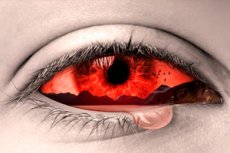New publications
A woman's tears... Smell?
Last reviewed: 29.06.2025

All iLive content is medically reviewed or fact checked to ensure as much factual accuracy as possible.
We have strict sourcing guidelines and only link to reputable media sites, academic research institutions and, whenever possible, medically peer reviewed studies. Note that the numbers in parentheses ([1], [2], etc.) are clickable links to these studies.
If you feel that any of our content is inaccurate, out-of-date, or otherwise questionable, please select it and press Ctrl + Enter.

In women's tears there are chemical components that can reduce the concentration of testosterone and stimulate some brain areas in men, which, in turn, changes their behavior and calms them down. This conclusion was reached by Israeli specialists, employees of the Weizmann Institute.
In the animal kingdom, chemical signaling is often used for the purpose of behavioral regulation of individuals. For example, the tears of female mice contain a peptide that simulates the activity of brain plexuses and levels the aggressive behavior of males. However, reliable information about the existence of such "signaling" in humans has not yet been available. It was found that in the tear fluid of women there is a marker, which, when entering the respiratory organs of men, lowers in them aggression, but the peculiarities and significance of this action have not been studied sufficiently yet. Taking into account the fact that lowering the index of testosterone is correlated with the elimination of aggression, the researchers decided to test their assumption in practice.
The scientists collected samples of emotional tear fluid from several female representatives, whose average age was 23.5 years. The control agent was isotonic sodium chloride solution. Additionally, two and a half dozen men of approximately the same age visited the laboratory for two consecutive days at the same time, where they participated in a computer game with a financial component. The game had provoking effects in which participants' finances were unfairly deducted.
After the experiment was completed, the level of aggression in the male participants was analyzed using the provocation ratio, which is the ratio of the number of revenge attempts to the number of provocations affecting the participants. A container in which 1 ml of female emotional tears (or placebo solution) was placed beforehand was offered to the male participants thirteen times with equal intervals of about 35 seconds. This approach reduced men's aggressive behavior by almost 45%.
Next, the experts performed brain scans on the participants' brains. With the help of functional magnetic resonance imaging scientists identified two zones correlating with aggressive behavior - we are talking about prefrontal cortex and anterior insular cortex. These zones were noticeably activated during game provocations, but were "silent" when men were offered to smell women's tears.
Experts suggest that the "signal" transmitted from tears, just as in mice, reduces the degree of male aggression. This may be due to the functional and structural overlap between the areas responsible for olfaction and aggressive behavior. It turns out that tears are a generalized part of a mechanism characteristic of all mammals. This mechanism represents the so-called chemical anti-aggressive defense.
The full article is available at pLOS Biology
